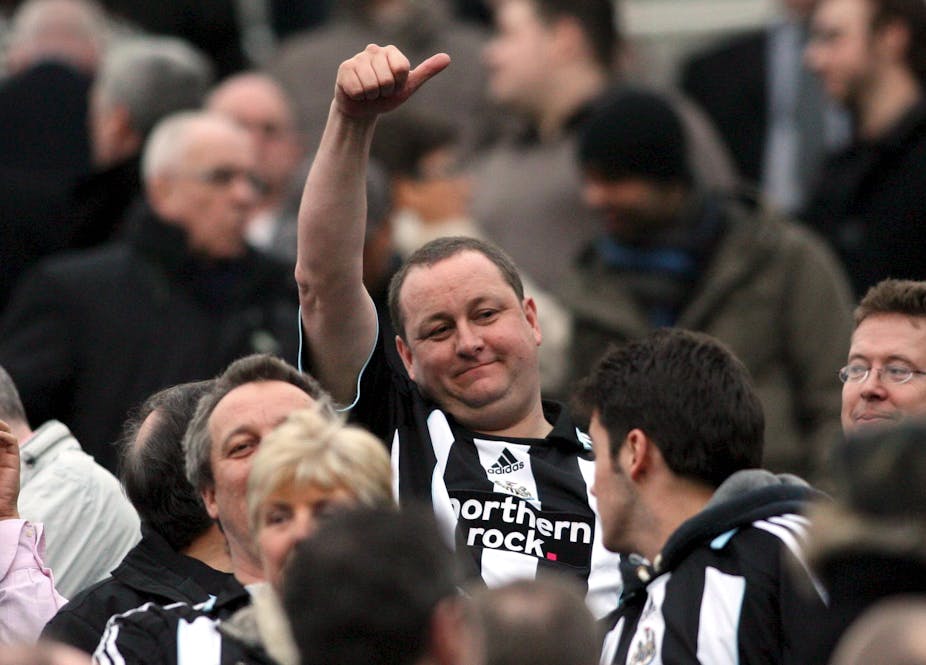One of the legacies of the Hillsborough stadium disaster in 1989 is the widespread and high-profile boycott in Liverpool of The Sun. That Britain’s biggest selling national newspaper experiences a circulatory black hole in a major city is an extraordinary and unparallelled media trend.
On the other hand, The Sun has always sold well in Newcastle, to the point where it even developed a regional edition with a different back page to the rest of the country when the local football team was in the news. That such close regional affiliations or disaffiliations can be forged between communities and national newspapers is powerfully evidenced through sport and this is unlikely to be lost on the strategists of media companies.
The organisational structures of sports desks see reporters allocated a geographical region where they work the beat of home football matches and press conferences. They are, in effect, regional journalists providing stories for national publications. But this set-up means reporters are dependent on a limited number of sources and can develop an intense relationship with them. It also creates a rather curious mix of camaraderie and competitiveness between rival journalists.
This leads us to current developments – The Sun stands accused of striking up a media partnership with Newcastle United, a charge which both newspaper and football club deny. The protagonists are North-East sports correspondents who allege The Sun was the only national newspaper invited to attend a press conference to interview new signing Remy Cabella on Monday. Last week’s Sun article on Newcastle United’s owner headlined “Why we should love Mike Ashley” is pointed to as further evidence that a deal has been done.

Whether or not The Sun and Newcastle United are in cahoots over media coverage, access deals between newspapers and sports clubs would be an unsurprising progression because the mutuality of benefit has collapsed. Gone are the days when sports clubs relied on the print industry for the oxygen of publicity. Newspapers need sports clubs more than sports clubs need newspapers and sports clubs know they have something that newspapers want. At least that’s the perception, and it does not help that newspaper circulations are in terminal decline and the print media is still transitioning to online business models.
The external communications departments of sports organisations can now cut out the middleman of the press and directly reach their audience through websites and their own TV channels. This is desirable because information can be controlled – unless, of course, media partnerships can be forged that are of mutual benefit commercially. Besides, editorial content is likely to be subject to copy approval under these circumstances. The stakes are high for sports owners – positive PR is important not just for the sake of the football club but for their wider business empire.
The money flowing into sport and the proliferation of new media outlets means more and more journalists are chasing after ever more valuable information. This has created an imbalance of source relations which makes the long-standing arrangement of a sports club offering free and obligatory access to the traditional print media both unsustainable and illogical.
We expect to see the broadcast media engaged in partnerships with leagues and organisations because they pay millions of pounds for the privilege to show televised sport. Yet there is an expectation of rights holders that they will promote the brand and not broadcast anything to its detriment. There is a mutual benefit here. The sport needs the exposure and money and the broadcast media need a sport that is popular and attracts viewers. Why would we not start to see similar arrangements with the print media? Why wouldn’t a newspaper serve a similar commercial purpose to an official systems partner or official stationery partner?
It’s not unreasonable to predict that a role as media partner means the badge of critical inquiry gets handed in at the gate and this is why it’s such a potentially damaging concept. Newspapers may be businesses but they have a duty to society to act as watchdogs on the corridors of power – that’s the principle behind a free press. If not the media, then who will expose the Lance Armstrongs of this world?
But the difficult question is should newspapers care? The British print industry only has to look at Spain to see the potential benefits. The sports press in Spain is considered biased towards its major football teams – El Mundo Deportivo and Sport are seen as pro-Barcelona while Marca and AS have perceived leanings towards Real Madrid. The problem is that this approach can conceivably put on sales and get the media closer to fans. Maybe it doesn’t matter if Real Madrid fans do not buy your paper if all Barcelona followers do, and vice versa. Will it therefore matter if Newcastle buys your newspaper and Liverpool does not?
It is the very fact that newspaper sports reporters are looked upon by the public as objective and independent agents who make sport’s gatekeepers accountable that makes them so important and relevant. Yet commercial considerations over-ride moral duty. If football sold its soul years ago, then the time may come when sports journalism does the same.
UPDATE: The Sun has asked us to include the following statement:
“As part of ongoing efforts to expand our commercial partnerships, The Sun is in regular talks with businesses in a variety of areas, including Sports Direct.
It is important to note that The Sun is not involved in any discussions that would give it exclusive access to a football club, or prevent other media outlets from having access. Nor is it considering any agreement that would compromise its editorial freedoms or independence.”

